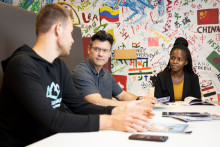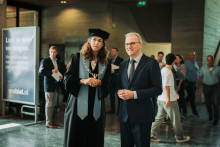According to Leonie Krab-Hüsken, the upcoming legislation is causing unrest and stress in the Chemical Science & Engineering (CSE) programme, especially among teachers who do not speak Dutch well enough to teach in that language. 'And it takes a lot of time, time that you'd rather spend on other things,' says the programme director.
1904
The 'What if' question – what if the programme does not meet the criteria from the Test for Foreign-Language Education (TAO) – haunts her mind. What if CSE – almost always top programme in the Keuzegids – will soon have to be taught largely in Dutch? 'That puts a lot of pressure on quality,' says Krab-Hüsken. 'In 1904, the Dutch physicist and chemist Johannes van der Waals published in English. In our domain, there are no relevant papers in Dutch and we have been working in an international classroom for years. We are not solving a problem with this law, we are creating a problem. The Dutch labour market is crying out for our engineers, and international alumni in this field are largely staying in the Netherlands.'
Bruins wants even tighter supervision
It will become more difficult for universities to offer English-language programmes. Education Minister Eppo Bruins wants to be stricter than his predecessor had in mind, he wrote to the House of Representatives last week.
Almost all foreign-language bachelor's programmes are subject to a test. If they do not meet the criteria, they must switch to Dutch. Exceptions remain possible. A programme may be taught in English if it is good for a shrinking region (where universities attract few students) or in the event of major shortages in the labour market. But Bruins wants to make it more difficult to appeal to the 'international character' of programmes and a fourth reason ('this is the only programme, so it has to be in English') is also less likely to be heard, as far as he is concerned.
'Cross-border challenges'
The CSE bachelor's programme welcomes more than fifty new students every year. Currently, about sixty percent of the students are Dutch. 'There's a reason why we teach in English. Our alumni work in a largely international field. The challenges in which we try to make a difference with chemical engineering are cross-border. Our Dutch students benefit from the international insights they receive.'
The course is taught in English at universities in the border region, Delft, Leiden and Utrecht offer the bachelor's programme in Dutch. Krab-Hüsken: 'If we have to switch to largely Dutch, the retraining of two-thirds of our international teachers alone will cost more than a million euros. Money that isn't there.'
No Dutch name
The minister said that he wants to make it more difficult to appeal to the 'international character' of study programmes. If there is one UT programme that fits into that picture, it is International Business Administration (IBA). In fact, if the programme needs to switch in the future, programme director Anna Bos-Nehles would first have to come up with a Dutch name. 'We're not there yet, but these are uncertain times for the programme. And that causes frustration. At the same time, we are forced to prepare for a scenario in which a lot will change for IBA.'
She finds it especially annoying for international students, who feel less welcome. If, in the long term, the programme – an annual intake of about 180 students, half of them international – were to be given two paths, the level of the programme would deteriorate. 'Especially in the first year, we consciously aim for a mix of Dutch and international students. In this way, they develop an international mindset, which makes them better professionals. If that disappears, the greatest strength of the programme disappears.'
Bos-Nehles knows that it will be difficult for IBA to appeal to uniqueness, and other universities also offer the programme. 'But let me emphasise that we are not business administration in English. Each programme has its own character.'
Joker for Civil Engineering?
Denie Augustijn also calls the minister's plans undesirable and senses a lot of uncertainty in the programme. Unlike his colleagues, the director of Civil Engineering has slightly more hope for an exceptional position: the enormous shortage on the labour market in the technology sector. But he also knows that the minister prefers to keep the number of exceptions as small as possible. 'If we have to switch to Dutch, then we have to, but changing things so rigorously creates an enormous amount of work and uncertainty for teachers and students.'
The programme – which welcomed almost a hundred first-year students in the summer, of which just over half Dutch – does not make any concrete preparations for the law, because too much is still unclear. 'I don't understand the 'why' behind the plans. Students already have the choice, because in Delft you can follow the programme in Dutch. I notice that many Dutch students consciously choose English, because they also want to do a master's. And the language of science is, by definition, English. Politicians like Pieter Omtzigt, who studied abroad himself, should understand that', says Augustijn.
He also fears that the Netherlands will throw away 'a fine piece of ambassadorship' if it turns more inward and welcomes fewer internationals. He refers to a statement by the French philosopher René Descartes: 'God created the earth, except the Netherlands. He left that to the Dutch'. 'As study programme, UT and the Netherlands, we are in a good position worldwide with our knowledge of technology. It's a shame to tear that down.'
psychology is already sorting
Starting next academic year, the UT Bachelor's programme in Psychology will have both a Dutch and English track, with a joint numerus clausus of 600 students. In doing so, the UT is already preparing for the Internationalisation in Balance Act. For the time being, the relatively large UT programme is the first and only one to become bilingual.






